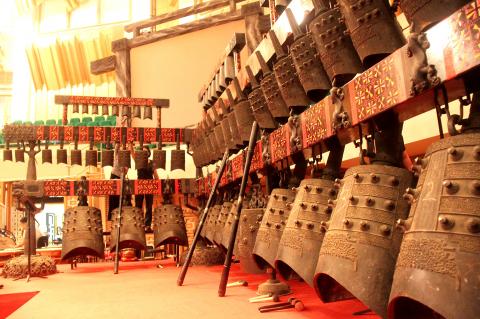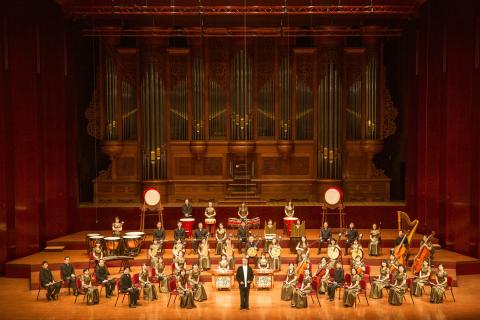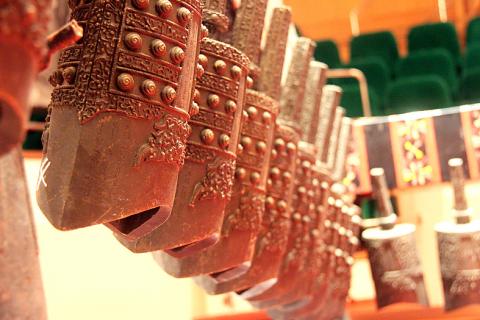The bianzhong (編鐘) is an ancient Chinese musical instrument consisting of 65 chime bells. Because it was only used for performances at the imperial court, it came to be known as the “instrument of kings” (王者之器).
The National Chinese Orchestra Taiwan (NCO, 台灣國樂團) has teamed up with the China’s Chinese Chime Bells Orchestra of Hubei (中國湖北編鐘國樂團) for When Bianzhong meets Organ (當編鐘遇上管風琴), a concert at the National Concert Hall (國家音樂廳) that brings together the melodies of the bianzhong with what Wolfgang Amadeus Mozart considered to be the king of musical instruments: the organ.
Conductor Yan Huichang (閻惠昌) who last year took over as NCO’s principal guest conductor, devised the repertoire to showcase original combinations between the two majestic instruments, and between early and modern Chinese musical instruments.

Photo courtesy of NTCH
GOING THROUGH TIME
The bianzhong used by the Hubei orchestra is a replica of a full set discovered in a state of near perfect preservation in the royal tomb of Marquis Yi of Zeng (曾侯乙), dating to the Warring States period, in present day Hubei Province. The 1978 excavation was important because it provided archeologists with a clearer understanding of ancient court musical practices.
Each bell produced two different musical notes, of a slightly different musical scale to Western music, depending on where they were struck. The twin-tone capability allows it to complete a 12-tone scale, Yan said.

Photo courtesy of NTCH
Yan said that the pitch of the replica bianzhong is slightly different because it has been tuned in a way suited to contemporary musical instruments and orchestral performances.
The bells are typically arranged on three wooden frames according to their pitches, which requires a meticulous process of assembling and dismantling.
The replica includes 65 bronze chime bells and weighs over six tons.

Photo courtesy of NTCH
“It takes 15 to 20 trained people two hours to install the bells,” Yan said.
Wang I-yu (王乙聿) will perform Majestic Demeanor (王者之聲), a new piece he wrote for pipe organ.
“On the one hand, Wang’s work delivers a robust contrast between bianzhong and organ; yet at some points, the two complement each other in harmony,” Yan said.
In addition to Wang’s work, the concert will stage five other compositions, such as German composer Robert Zollitsch’s Resounding Chimes. Zollitsch, who goes by the name Lao Luo (老鑼), visited the Hubei museum to study the timbre and performing techniques of the chime bells first hand.
“Lao Luo’s piece employs nearly all 65 chime bells, which needs 13 performers to play. The extensive use of the bells brings bianzhong music to another level,” Yan said.
When Bianzhong meets Organ is a part of the Taiwan International Festival of Arts (台灣國際藝術節), which began earlier this month.

Taiwan has next to no political engagement in Myanmar, either with the ruling military junta nor the dozens of armed groups who’ve in the last five years taken over around two-thirds of the nation’s territory in a sprawling, patchwork civil war. But early last month, the leader of one relatively minor Burmese revolutionary faction, General Nerdah Bomya, who is also an alleged war criminal, made a low key visit to Taipei, where he met with a member of President William Lai’s (賴清德) staff, a retired Taiwanese military official and several academics. “I feel like Taiwan is a good example of

March 2 to March 8 Gunfire rang out along the shore of the frontline island of Lieyu (烈嶼) on a foggy afternoon on March 7, 1987. By the time it was over, about 20 unarmed Vietnamese refugees — men, women, elderly and children — were dead. They were hastily buried, followed by decades of silence. Months later, opposition politicians and journalists tried to uncover what had happened, but conflicting accounts only deepened the confusion. One version suggested that government troops had mistakenly killed their own operatives attempting to return home from Vietnam. The military maintained that the

Before the last section of the round-the-island railway was electrified, one old blue train still chugged back and forth between Pingtung County’s Fangliao (枋寮) and Taitung (台東) stations once a day. It was so slow, was so hot (it had no air conditioning) and covered such a short distance, that the low fare still failed to attract many riders. This relic of the past was finally retired when the South Link Line was fully electrified on Dec. 23, 2020. A wave of nostalgia surrounded the termination of the Ordinary Train service, as these train carriages had been in use for decades

Lori Sepich smoked for years and sometimes skipped taking her blood pressure medicine. But she never thought she’d have a heart attack. The possibility “just wasn’t registering with me,” said the 64-year-old from Memphis, Tennessee, who suffered two of them 13 years apart. She’s far from alone. More than 60 million women in the US live with cardiovascular disease, which includes heart disease as well as stroke, heart failure and atrial fibrillation. And despite the myth that heart attacks mostly strike men, women are vulnerable too. Overall in the US, 1 in 5 women dies of cardiovascular disease each year, 37,000 of them